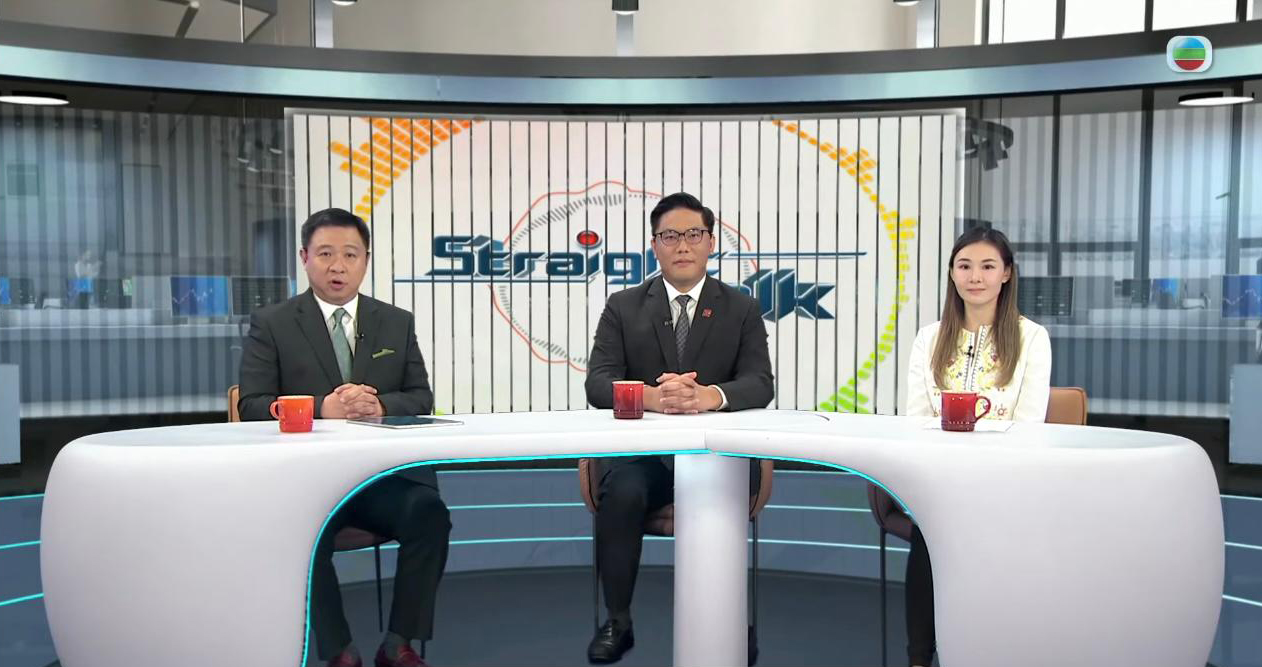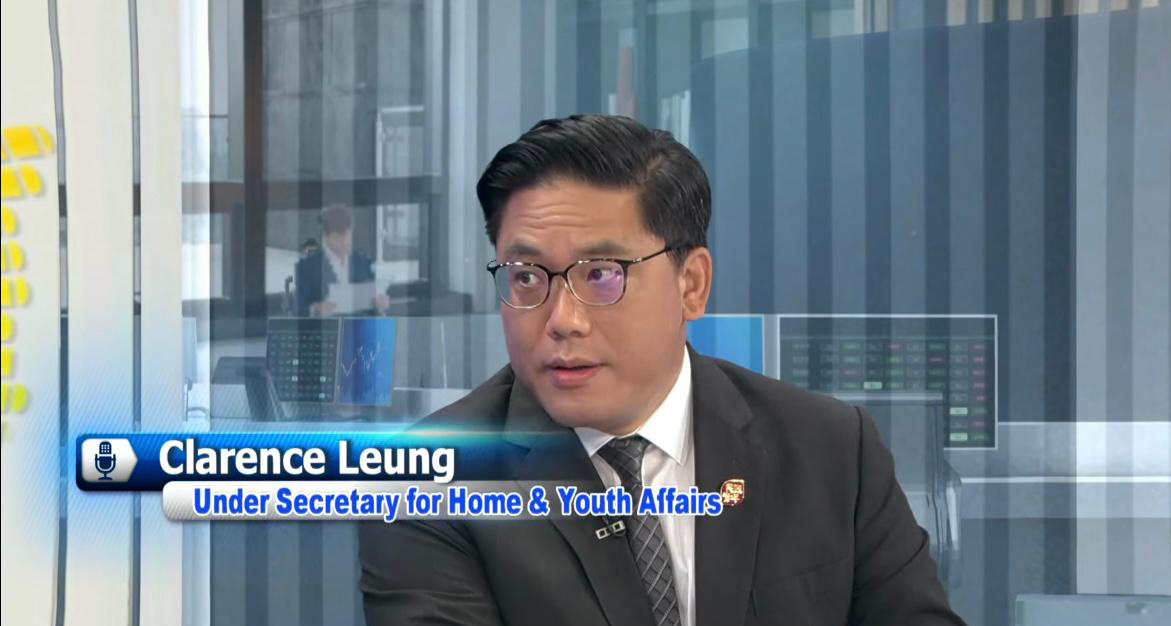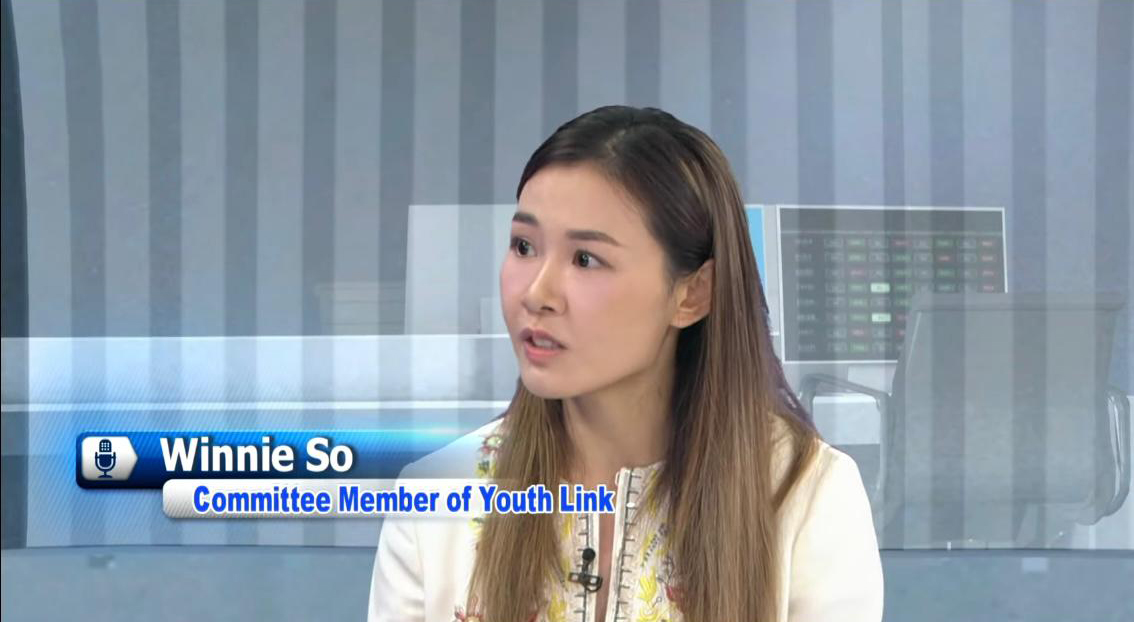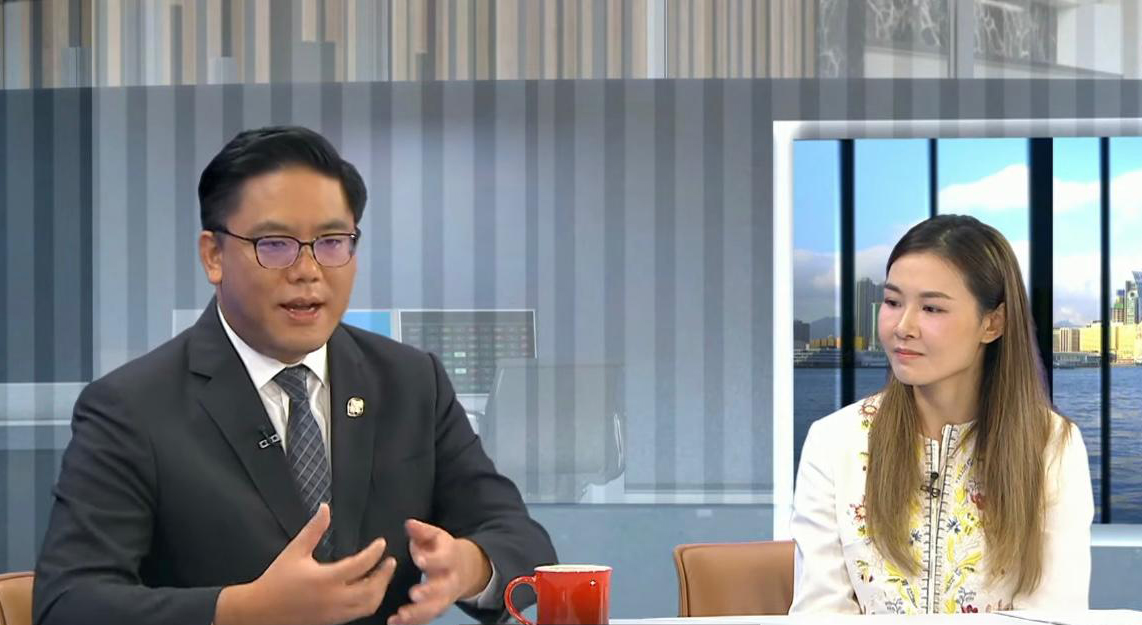
Under Secretary for Home and Youth Affairs Clarence Leung Wang-ching and Youth Link committee member Winnie So are on Straight Talk this week.
Leung talks about how measures are being implemented to inspire young people to become patriotic, thinking positively, to provide a better future for Hong Kong. So shares her experience as a participant of the recent Youth Summit.
Check out the full transcript of TVB’s Straight Talk host Dr Eugene Chan’s interview with Clarence Leung and Winnie So.
Chan: Good evening, and welcome to Straight Talk. I'm Eugene Chan, and this evening we have two guests with us to explore the future of Hong Kong's youth. Firstly, Clarence Leung, under secretary for Home and Youth Affairs and vice chairperson of the All-China Youth Federation, will share with us his insights into the government's vision and ongoing efforts. An Honors graduate from Cambridge, Leung has already had over 20 years of public service experience, having held various key positions in government committees, including the Youth Development Commission and the Hong Kong Tourism Board. And joining him is Winnie So, a passionate committee member of Youth Link, a platform which is dedicated to emerging and nurturing the next generation of leaders. So is also a member of the District Services and Community Care Teams. Welcome, Clarence and Winnie!
Leung: Thank you!
Chan: Very happy to have you both here to talk about the youth issue in Hong Kong, and Clarence, let's start with you first.
Leung: Sure.
Chan: Alice Mak, our secretary for home and youth affairs, was on the show last year and she was explaining to us the youth development blueprint, which was released by the government in December 2022. Some 18 months have gone on the track now. So how has it been, the actual progress?
Leung: I think the progress has been quite promising. To be honest, our vision is to nurture our young people to be patriots, also to possess a good worldview. We also want them to have aspiring and a positive mindset. And we have, since 2022, we have, up till now, released or published more than 200 measures from different bureaus and departments across the government, and we work closely with our colleagues within the government, and many of the measures are in good progress. And I think we have already accomplished 50 to 60 measures already, which is good for us. At the same time, another aim is to work closely with people in the business sector and also with various NGOs, to come together and to build different platforms to provide our young people with different opportunities. And we see that happening in the past 18 months. The Youth Development Summit that happened early August, organized by the government, is a testament to that. We had a bank sponsoring, we have the Jockey Club sponsoring, we also have NGOs helping to put together different side programs and to make the youth summit happen smoothly. So, it's a testament to that. And we also have that cooperation and different measures within our development program. So, we’re happy with that.
Chan: Yes, we will come back to the Youth Summit, which is, sort of, a very first thing for Hong Kong, which I'm sure the public will treasure. Because this is something important for the youth. You have mentioned the actual directions of the blueprint, and how do you measure it? Because you mentioned that it was quite successful when our Chief Executive, John Lee Ka-chiu, often mentioned the word KPI. So, what metrics do you use to actually measure the success of it, or how you can improve from it?
Leung: Well, first of all, as I mentioned, we have published more than 200 measures, and each of the measures we have a KPI, basically stating what we want to achieve with that particular measure. For example, we have numbers of participants that we want, or our target number of participants for our exchange programs and for our internship programs, and those numbers are increasing and quite promising. For example, this year, we see that there are more and more young people applying for different exchange and internship opportunities. So this is why I'm saying it's quite promising.
Chan: Right before I'm going to turn the question to Winnie, I want to ask you, I'm sure the viewers are going to ask you, what is the definition of the word youth? I mean, how many people are we looking at, from what age to what age?
Leung: Well, we are looking … we don't want to have a very strict definition, but for the 200 measures that I mentioned, we service the age range from 12 to 39. Obviously, not all measures will fit 12 to 39 because young people at 16, for example, will have different aspirations to young people at 30. So, we have different measures for different age ranges. But all in all, for the 200 measures, we're looking at the age range of 12 to 39.
Chan: Shall we say, about one to two million of the population?
Leung: About two million, yes.
Chan: Right. Winnie, you've been involved in all the youth programs and I'm sure being there, you appreciate the government is trying to do a lot for the youth. Do you think this is a good intention, or after the blueprint has been effectively communicated to all the youth? Because two million people is a lot of … it's a big number.
So: Yes, indeed. And I think it's very encouraging to see that our government has really taken a lot of effort to plan and take forward our long-term youth development work in a holistic approach. As a youth in Hong Kong, I do think that long-term planning is very, very important. And I'm very happy to see that the Hong Kong government really takes forward, to step forward, to plan on it. And as Clarence mentioned, this year, we have launched a new platform, which is called Youth Link. It is a new platform to engage youth people, to have more interactions for constant and also in various topics. And I think it's a very productive approach to engage.
Chan: Clarence, since Winnie is very supportive to the program, do you actually get … I mean, how do you actually take all the feedback from the youth group and do policy revisions? Because your blueprint is basically a blueprint. The actual measures, have you actually changed any of the measures?

Leung: Yes, I think Eugene, that's a very good question. I think before, when we published the blueprint, we actually went around and spoke to different age groups of young people. There would be secondary students, university students, young people who are working, young parents, for example. So we actually engage thousands of young people before we publish the blueprint and after we publish a blueprint, that effort has not ended. We kept on seeing young people. Me as well as our Secretary Alice Mak, myself and my colleagues actually, regularly sit down with young people and listen to what they have to say. We always recognize that Hong Kong young people are very diverse. They are from different ethnic backgrounds. For example, they have different interests. Some would aspire to be scientists, some aspire to be artists, for example. So we need to listen to different groups of young people and to revise. For example, this year, we see that our young people have more and more interest or even concerns towards mental health. A lot of the 60 measures that we renewed or we pushed out this year are related to that, for example. So, that's very important. And Winnie mentioned Youth Link, which is a platform. We have more than 10,000 members right now. We hold different events regularly, and even exchange events every month. So, this is a good way for us to engage young people.
Chan: Actually, it is sort of actively continuing to develop, isn't it?
Leung: Yes.
Chan: Right, when you think you're on Youth Link. I mean, how briefly, tell us your role with the Youth Link. And actually, how do you see the government actually being able to engage some young people that usually are not able to typically participate in government-led initiatives?
So: I think, from the Youth Link platform, we have initiated a very brand new dialogue, which is called Youth Dialogue. We engage in regular conversations with our young people, to let them meet our government officials, and to let them have a platform to directly communicate with them, which is a very proactive approach.
Chan: But how does it link with people that do not usually have a chance to join all these government-led initiatives?
So: Well, actually, I think it's a channel that for us as a youth, normally through email or phone, we can't express our opinion to the government, but somehow face to face interactions, I think that is a very important part, and which, I think this linkage cannot be replaced by email or phone, which in-person meeting is a crucial.
Chan: How do you see the impact so far? I mean, it's a very short time. It's only 18 months.
So: Yes.
Chan: How did it go so far?
So: We tried a few times, and I do. I'm very happy to see that more and more people apply for that. I'm very encouraged as well as a Youth Link committee member.
Chan: Clarence, since so far, you’ve been very encouraging from the youth group, but I'm sure there's a lot of work ahead. But in order to be more proactive, I'm sure you need another department or other bureau or the government to work with you. How does the other Bureau work together in this good blueprint that you have?
Leung: Well, I think the whole government has a great attitude towards young people. The cover of the youth development blueprint is to inspire support and embrace. We want to inspire our young people. We want to support our young people once they get inspired, and they have set their own life goals. And we want to embrace the diversity and achievements of our young people. And same goes to other bureaus. We have other departments or other bureaus calling up our Commissioner for Youth, advising or suggesting certain measures that could help our young people. And you can see that most of our 200 measures are actually suggested by our various different bureaus across the government. So, again, it's encouraging. It's hard work for everyone, but I think we all realize and recognize, while our young people are exceptional in many ways, we also should provide different platforms and opportunities for our young people to develop.
Chan: Right, okay, let's take a short break now. But the viewers, stay tuned. We will be right back.

Chan: Thank you for staying with us. Clarence Leung, the under secretary for Home and Youth Affairs, and together with Winnie So from the Youth Link, are with us this evening, to share their insights into how Hong Kong youth can be empowered to shape Hong Kong’s future. So, thank you very much for Clarence and Winnie telling us what has been happening with the government’s youth blueprint. And indeed it is very encouraging, I like the terms that you’ve used: we actually inspire, support, and embrace.
Leung: Yes.
Chan: I think it’s very good, very good terms that we use. So, let’s talk about the Youth Summit. Since you mentioned it is sort an inaugural international summit that happened a few weeks ago. What was the actual attendance like?
Leung: Well, I think the attendance was … it beat all expectations. We initially, we were targeting about 1,000 young people attending. In the end we had 2,400 young people registering. Not to mention there are another few thousand who watched online. We also invited speakers from abroad, especially government officials who are responsible for youth from Saudi Arabia, Malaysia, and Laos. And also we had different experts, industry experts from different places in the world that came. But at the same time, equally importantly, we also invited young people from around the world as well to attend. So, we had young people from Japan, we had young people from Laos, we had young people from Malaysia, Singapore, and so on and so forth. So, it was very encouraging, all together we had around 500 young people from outside of Hong Kong, which included the Chinese mainland, and also the rest of the world.
Chan: Right. Clarence, I am sure all the youth in different cities will face different issues or challenges. What will be the key lesson that, you think, actually you learned from it because they are all from abroad, that you think we can actually apply to the youth in Hong Kong? I am sure we give them a much wider perspective in general, but what else do you pick up?
Leung: Well, I think it's … on the outset, we want to showcase how exceptional our Hong Kong young people are, and how suitable Hong Kong as a world city, is for young people to develop in, not only for young people from Hong Kong, but also young people from around the world as well. Interestingly, when we met with the different government officials from various countries, we actually shared a very similar, we shared very similar views of our youth, and what needed to be done for our young people as well. So, we felt encouraged because what we're doing is shared by many, and should be on the right track.
Chan: Right.
Leung: And I think what we learned from the Summit and I hope that our young people can learn from the Summit, is Hong Kong, together with mainland’s support, is indeed a great place for young people from around the world, including Hong Kong, to develop in.
Chan: Right. Winnie, you were there. And what impact has the Summit had on you? And do you see any opportunities after you been listening to all those speakers?
So: Yes, especially I am very impressed of the design and of the message that the Summit delivered. Actually because there are a lot of speakers from different countries, different industries, to youth actually we have different interests. And for these diverse topics, it offers different aspirations as well. And I think the key message to me is very positive. It's because we see there are many opportunities that the speakers shared with us. There are many chances that we can be leaders in many ways, sectors, or even cross sectors, cross industries. So, to us, it was a very positive message.
Chan: Right. Do you hear other feedbacks from your friends or other youth that you've met?
So: Yes, definitely. Actually there was a message I received from my friends, and also the peers that I shared with friends abroad, they are from Laos, the Philippines. And to me, it was a very special platform because I've never got a chance to be in Laos or the Philippines. And very encouraging to me that I can have a chance to talk with them in person and to learn from them.
Chan: Right.
So: Especially right after the Summit, we hear what the speakers shared, and then we communicated, and then we also shared our thoughts. It really made the sparks happen.
Chan: Right. Clarence, I am sure the viewers, at this stage, is going to ask you. I mean we have all been youth, we all deal with youth every day. While we all have these good intentions to bring to them for betterment of Hong Kong, but it’s often said that youth they don’t listen or it is sort of hard to communicate to them. Have you encountered that? And how do you solve it?

Leung: Eugene, I think you are still very young at heart, number one. Number two, yes, I think it's very important to find a way to communicate with young people. I think our Youth Development Summit was designed also around that, that we picked topics that would be of interest to young people. For example, we picked technology advancement, we also picked arts and culture and sustainability, we also picked positive thinking and giving back to the society. I think those are very close at heart to young people in Hong Kong, and also from around the globe. We also want to find different ways to engage our young people. We mentioned we have a Youth Dialogue at Youth Link that happens every month. We tend to pick different topics that would interest different groups of people or members of the Youth Link, that will come to listen. I think it's important to find topics that are of interest to young people, and also deliver those message in ways that they would accept. And it brings me, lastly to Youth Fest, which basically is happening now up till December. There will be a lot of different activities for young people to join of different nature. It could be arts, it could be cultural, it could be sports related. Our aim is to bring young people together, they can play whatever they like in a group, meet people, and then try to learn something and take something back.
Chan: Right.
Leung: So, this is what we are trying to do. And we will work tirelessly and try to engage different young people using different methods.
Chan: Right. Clarence, I want a brief answer from you. Based on the success of this inaugural Summit, I am sure that you will continue to think of new ideas. Do you have any plans for any future youth development projects? And any sort of new themes or areas you think you will be working on for next time?
Leung: I think we are working very hard on various different projects. One thing that we are proud of and we are working hard on is our youth app. So, we have basically launched a youth app, well, soft launched a youth app by the end of March. And we will officially launch it quite soon. On that app, it’s basically … I think there are two main points I want to make. One is the design and the feel is youth oriented.
Chan: Right.
Leung: The contents of which we actually worked with a team of young people, who would write and edit from a young perspective. And secondly, basically all of the Bureau’s activities, different activities abroad, or even locally in Hong Kong, or even locally in different districts, would be on the app. So, young people can go and basically view what kind of activities they can join, and some of them that you can even register online as well. We are working on that and we have high hopes for that.
Chan: Good. Winnie, any suggestions to the bureau that as a participant for the future Summit, anything you’d like to see?
So: Yeah, actually the youth app, I have used a lot. And I have shared with Clarence before, because sometimes we want to search something specifically in the app, and then we don’t know the way. But then right now we have a search engine, which I see improvement in the app as well. So, I think it takes time, there are a lot of first attempts, but there are opportunities for us to learn and grow and improve in the future.
Chan: Right. Any take home messages after you attended the Summit, that you can share with the other Youth Link members?
So: Yes, I think that as a youth, we always feel the challenge that, we all have our own talent, but how can we unleash our full potential? I think we need to use opportunities that every single Hong Kong government, not only the HYAB offers, but whatever the opportunities that we need to dedicate to improving ourselves.
Chan: Looking ahead, Clarence, what will be the government's plan in terms of youth development, in terms of in the next few years? I mean you have the blueprint now, you had the summit, everything is working well. What will be the ultimate goal?
Leung: I think the ultimate goal, as I mentioned, is the vision that we had. We want to nurture our younger generation to be patriots, to have a healthy worldview, and have aspiring and positive mindset because I think the development of Hong Kong in the future depends very much on our young people. And if our young people are inspirational, if our young people keep thinking positively, I think Hong Kong, as an international city, will become better and better.
Chan: Good. Winnie, what will be your message to the youth in Hong Kong?
So: I think Hong Kong is a very special city, we need to treasure what we have, and be positive, and we can be better in future.
Chan: I am afraid that is all the time we have. I think we can keep on going. And thank you both for sharing your insights on how the youth development blueprint and Youth Link are empowering our youth to shape Hong Kong’s future. It is clear that with initiatives, like Youth Fest and the Youth Summit, the government is committed to providing opportunities for youth to explore, to contribute, and to thrive.
As President Xi himself said, “A nation will prosper only when its young people thrive”. Thank you for joining us and have a good evening. Thank you!


